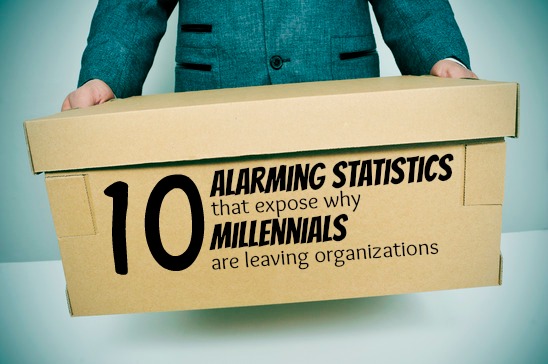The greatest talent challenge currently facing the world’s employers is engaging the Millennial generation. Businesses run the risk of losing a large percentage of their workforces if they do not adjust to nurture loyalty among Millennials.
In Deloitte’s recent 2016 Millennial Survey, they collected the views of nearly 7,700 Millennials representing 29 countries around the globe. All participants were born after 1982, have obtained a college or university degree, are employed full-time, and predominantly work in large (100+ employees), private sector organizations.
The survey had a focus on Millennials’ values and ambitions, drivers of job satisfaction, and their increasing representation on senior management teams.
Millennials are leaving.
Millennials have recently become the largest share of the US labor market. In this current survey, 12% of Millennials are either the head of a department or division or 7% have a position within his or her senior management team or board.
Millennials are no longer the leaders of tomorrow but rather are rapidly becoming the leaders of today. Yet there is remarkable absence of Millennial loyalty and engagement that represents a serious challenge to the longevity of any business.
- 66% of Millennials expect to leave their organization by the end of 2020.
- Only 16% of Millennials see themselves with their current employers a decade from now.
Related Read: 22 Helpful Statistics for Recruiting and Engaging Millennials at Work
Millennials are leaving. Why?
The lack of leadership development and flexibility.
The primary factor contributing to the decline of Millennial loyalty is the Millennial belief that businesses are not doing enough to bridge the gap to ensure a new generation of business leaders is created. Millennials feel underutilized and believe they’re not being developed as leaders.
- 63% of Millennials believe their leadership skills are not being fully developed; and yet the #1 most important driver for Millennials to evaluate job opportunities is the ability to progress and take on leadership roles.
- 71% of Millennials likely to leave a company within two years believe their leadership skills are not being fully developed.
- Only 24% of Millennials are “very satisfied” with the learning opportunities and professional development programs at work.
- 50% of male and 48% of female Millennials say they are “being overlooked for potential leadership positions.”
- Only 28% of Millennials in 2015 felt that their current organization was making ‘full use’ of the skills they currently have to offer.
Related Read: The Generational Gaps Between Today's Leaders and the Future Workforce
The secondary factor contributing to Millennials leaving organizations is the lack of workplace flexibility.
- 88% of Millennials wish they could have greater opportunity to start and finish work at the times they choose.
- 77% of Millennials wish to have greater mobile connectivity, such as via tablets and smartphones.
- 75% of Millennials would like to start to, or more frequently, work from home or other locations where they feel more productive; only 43% currently do so.
Question: Why else do you think Millennials leave organizations?
Consider Ryan Jenkins to be your next Millennial/Generation Y or Generation Z keynote speaker by clicking here...
![]()






